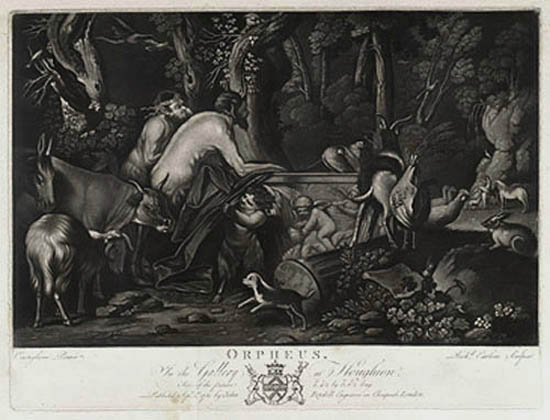| Title: |
Orpheus |
| Engraver: |
Earlom, Richard (London, 1743 - 1822) |
| Designer: |
Castiglione 'Giovanni Benedetto Castiglione' (1609 - 1664) |
| Date: |
1781 |
| Medium: |
Original Mezzotint Engraving |
| Publisher: |
John Boydell, London |
| Source: |
The Houghton Gallery |
| Note: |
Richard Earlom: One of the greatest eighteenth century
mezzotint and stipple engravers, Richard Earlom was apprenticed to the
London based engraver, Cipriani, in his youth. He began work for John
Boydell in 1774, taking five years to create the two hundred plates which
comprise the Liber Veritas set. These engravings showed the world
the remarkable effects a combination of mezzotint and etching could produce
on landscape art and gained for both Earlom and Boydell a long lasting
fame. In fact, in the following century, these Earlom mezzotints directly
influenced the landscape art of Turner. |
| |
During the following decades Earlom engraved outstanding
works both after the designs of his contemporaries and after the old masters.
Boydell continued to commission his talents for some of the most famous
plates in both The Houghton Gallery and the Shakespeare Gallery.
As one can easily see in this original engraving, entitled, Orpheus,
Earlom was without equal in capturing the rich tonal qualities of the
demanding mezzotint medium. Today, Earlom is most appreciated for his
technical virtuosity and mastery. |
| |
John Boydell was clearly one of England's most remarkable
18th century people. Born to a poor family, he began his career as an
at best mediocre engraver of book plates. At this time England was at
a very low ebb as a serious centre for the creative arts (particularly
engraving) and Boydell sought to eradicate this problem by beginning a
second career as a print publisher. Modest experiments in the 1760's led
to a rapid expansion and the mid 1770's saw the publication of his Liber
Veritas, with mezzotint engravings by Richard Earlom after the drawings
of Claude in the King's Collection. This expensive undertaking put England
back on the printmaking map and was a huge financial success for Boydell. |
| |
Some of the finest mezzotint engravings in the history of
British art belong to Boydell's series known today as The Houghton
Gallery. Beginning in 1781, Boydell commissioned England's best mezzotint
artists to engrave the paintings by Italian Renaissance masters in the
collection of the Empress of Russia at Houghton. In total, one hundred
and twenty-eight plates were created by the time the set was completed
in 1788. This original mezzotint engraving is one of them. Once again,
these engravings were widely acclaimed and John Boydell now found himself
as the head of England's most influential publishing house. This is evidenced
by the fact that midway through The Houghton Gallery, Boydell's
nephew, Josiah, had joined the venture. Richard Earlom's original mezzotint engraving,
Orpheus based upon a design created by Giovanni Benedetto
Castiglione is a fine, original example from this set. |
| |
John Boydell had now established England as a major capital
for the arts and this once poor and struggling artist was now acknowledged
for his efforts by being elected no less than Lord Mayor of London in
1791. The same year marked the ill fated beginning of Boydell's most ambitious
and final undertaking. His new publishing house, "the Shakespeare Gallery",
commissioned the most famous painters and engravers in Britain to create
and design large stipple engravings based on the plays of William Shakespeare.
This monumental experiment continued until Boydell's death thirteen years
later. By that time "the Shakespeare Gallery" had published 170
large engravings. Alas, the expenses for this vast undertaking had been
so large that England's foremost publisher of art ended his life the way
it began and died a pauper. |
| Size: |
11 1/4 X 14 1/2 (Sizes in inches are approximate,
height preceding width of plate-mark or image.) |
| |
Framed and Matted with 100% Archival Materials |
| Condition: |
Printed upon eighteenth century laid paper and with full
margins as published by John Boydell in London in 1781. Very slight foxing
exists in the outer margins but the actual engraving is in near excellent condition throughout. One should here take note that this is a very early
impression of Orpheus. Eighteenth century mezzotint engravings yielded
at most one hundred satisfactory impressions. Only the first handful of
impressions would exhibit such strong and velvety tonal values as one
sees here. Orpheus is therefore a very scarce and valuable example
of the art of Richard Earlom and of the eighteenth century mezzotint engraving. |
| Price: |
Sold - The price is no longer available. |
| Important Information: |
The artist biographies, research and or information pertaining to all the original works of art posted on our pages has been written and designed by Greg & Connie Peters exclusively for our site, (www.artoftheprint.com). Please visit us regularly to view the latest artworks offered for sale. We will soon be posting an update of our most recent research and include the biographical and historical information pertaining to our next collection of original works of art created by artists throughout the centuries. We hope you found the information you were looking for and that it has been beneficial.
Our Gallery, (Art of the Print / www.artoftheprint.com) guarantees the authenticity of every work of art we sell 100%. Full documentation and certification is provided. We offer a wide selection of international fine art dating from the early Renaissance to the contemporary art period. |














![]()
![]() or
phone Greg & Connie (905) 957-6666
or
phone Greg & Connie (905) 957-6666